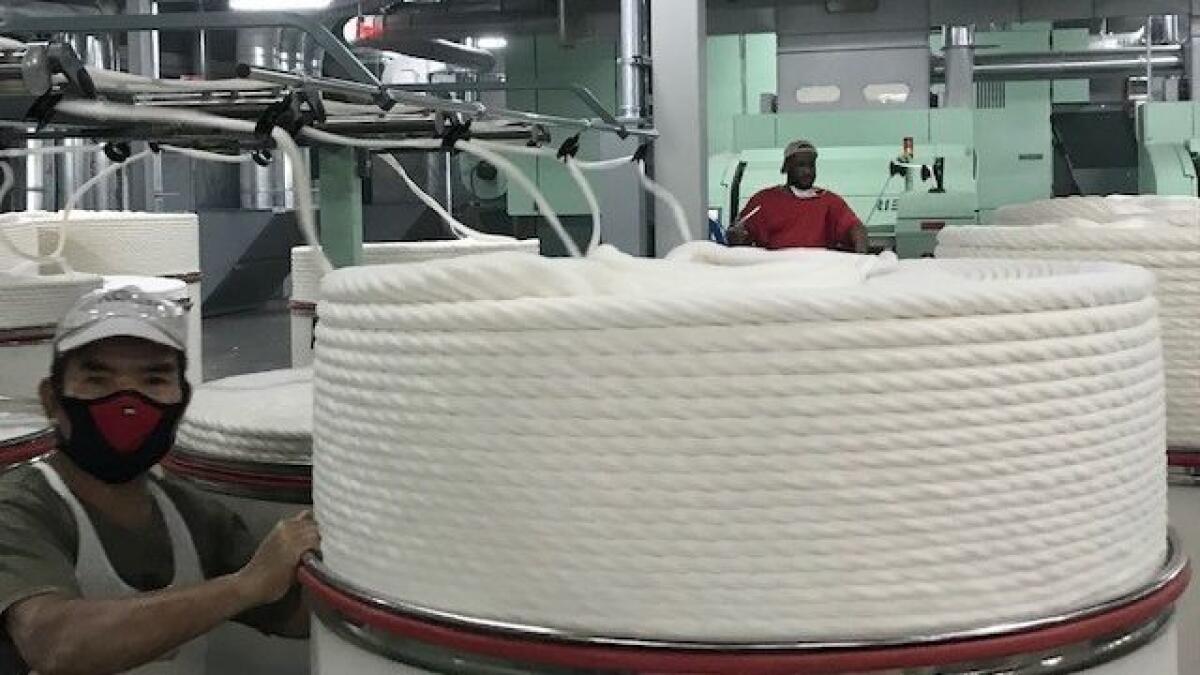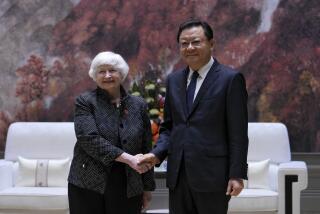Casualty of trade war: Chinese investments in U.S. grind to a halt, blocking new jobs

When a relatively unknown Chinese company called Jushi built a state-of-the-art fiberglass factory in the pine woods of South Carolina not long ago, it made a big splash.
In a chronically depressed area where the most conspicuous features include small churches and bail-bond offices, some 400 people flocked to the new plant for jobs. Jushi, which means giant rock in Chinese, began production in May.
It looked like a happy reversal of an all-too-familiar pattern: Instead of U.S. factories fleeing to China and leaving thousands of American workers floundering, here was a Chinese company setting up in the United States and offering good old-fashioned factory jobs to Americans.
Unhappily, like many other potential bright spots in the U.S. economy, new plants like Jushi’s have become a casualty of the yearlong trade conflict between the U.S. and China.
And although President Trump and Chinese President Xi Jinping declared a ceasefire in the trade war when they met at the G-20 conference this weekend in Osaka, Japan, the truce, even if it holds, seems unlikely to undo the damage.
Trump and Xi agree to restart trade talks and put a hold on new tariffs »
Chinese foreign direct investments in the United States, including new plants and commercial developments, sank last year to just $5 billion, from $29 billion in 2017 and $46 billion the prior year, according to the Rhodium Group, a New York-based economics research firm with a specialty in China.
Jushi has plans for a second phase of its $400-million project, but that, and the additional jobs it would provide, are now on hold, say local government officials. The company declined to comment.
Rising tariffs and tighter scrutiny over Chinese managers’ visas already made for a bumpy opening, and officials say it’s no surprise the company has put its expansion plans on ice.
“When I see them, I know what I hear,” said Jeff Ruble, economic development director at Richland County, where Jushi is. “Tariffs and visas are the first things they talk about.”
Jushi is not an isolated case.
About 80 miles to the north, another Chinese entrepreneur, Zhu Shanqing, had been turning the clock back to an earlier era of American manufacturing strength by investing in a Southern industry long crushed by foreign competition.
In recent years, Zhu has plowed more than $200 million into building two yarn-spinning facilities near Rock Hill, once a bastion of South Carolina’s cotton textile industry.
The 53-year-old says his new American mills, part of the Keer Group based in Zhejiang province, along the Chinese coast south of Shanghai, would have 650 employees today, not 400, were it not for tit-for-tat tariffs from both countries.
Zhu, a self-made millionaire with a fondness for fishing and mai tai, had drawn up plans with some hometown buddies to develop a 1,000-acre, $1-billion industrial park in South Carolina.
“In the current climate,” he said, “we had to put it on hold.”
One of Keer’s two plants is dark at the moment. It was equipped with the latest open-end spindles for spinning yarn, but the cloth the plant produced was for export to China — that is, until the tariff wars wiped out $40 million in sales last year.
Still, Zhu vows to make a profit by the end of next year, trade war or not. He bought an office in Charlotte, N.C., and a Tudor-style house in an upscale suburb where he stays when he visits every three or four months. Cotton prices are a third less here than in China, he says, and he relishes the idea of making it in the world’s largest market.

“We will succeed,” he said, raising a glass of mai tai as he dined on braised duck and stir-fried tofu prepared by his personal assistant at his North Carolina home. “Come back next year this time,” he tells a visitor.
The plunge in Chinese investment in the U.S. has been felt particularly hard in South Carolina, which had pulled far more than its weight in the competition to attract investments from China.
Over the last decade, Chinese investors have spent more than $10 billion on greenfield projects in the United States. South Carolina captured 10% of that, much more than Michigan, Illinois and Washington.
Like other states in the South, South Carolina marketed cheaper operating costs and nonunion labor. It also spruced up the port of Charleston and offered a boatload of incentives to lure manufacturers from around the world, including BMW, Samsung and Michelin.
The result is that South Carolina has become heavily dependent on international trade and very susceptible to trade conflicts.
“It’s like a domino effect. With a trade war going on, people cannot have stability,” said Joyce Dickerson, chair of the Richland county council. She blamed Congress for letting the tariffs get out of hand, and Trump for starting it all.
“He can’t negotiate with people’s lives like this. His approach is not making America great.”
For South Carolina, the China bonanza took years of groundwork. The state’s Commerce Department was one of the earliest to dispatch a rep to China, stationing John Ling in Shanghai in 2005 to go after new investments.
A native of Chongqing in central China, Ling had come to the United States in 1991 as an exchange student, enrolling at a Baptist university in Charleston where his uncle was pastor of a church. Ling graduated not with a degree in theology, but an MBA.
He went to work at the state Commerce agency, and in 1999, cracked the China market by persuading Haier Group Corp., a Chinese firm, to bypass Florida and Connecticut and open a refrigerator plant in Camden, a 40-minute drive from Columbia. The $30-million investment created 250 jobs.
Jushi was Ling’s biggest catch. Ling remembers making his first sales pitch to the company in 2013 and being told by the company’s chairman, who was seated at a square table with five executives on each side, that Ling had just wasted everybody’s time.
But later that year, the chairman and his executive team came for their first visit to South Carolina, eventually settling on a stretch of woodsy land on the outskirts of Columbia, the state capital.
What drew Jushi was partly logistics, to be closer to the U.S. market, and cheaper and more reliable utilities. Another plus was that South Carolina is replete with kaolin, a type of clay used in making fiberglass.
Labor costs in South Carolina were more than double those in China, but wages were rising rapidly there. And state and local governments in South Carolina offered Jushi an attractive package: 250 acres of free land; tax credits and rebates; help with worker training and road improvements; and several million dollars in cash grants.
Jushi agreed to spend $400 million and hire 800 workers, breaking ground in December 2016.
The company is partly state-owned, and its U.S. head, William Woo, declined to comment for this article, citing the trade conflict.
“It’s actually a good deal for Chinese companies because land is so expensive and taxes are a pain” in China, said Frank Xie, a business professor at the University of South Carolina at Aiken. But it’s getting harder for them to invest abroad, he said, as Beijing has tightened currency controls to prevent flights of capital.
“They have the money, but they can’t get the foreign exchange, the hard currency,” he said.
The biggest investment constraint, though, is largely self-imposed and not likely to lift soon.
“On one side I’ve never seen such a strong pipeline of projects. On the other side, I’ve never seen such anxiety from them,” said Ling, 53, who launched his own consulting firm after leaving the state government and currently has about a dozen deals, now basically frozen.
On average, Jushi’s workers earn about $18 an hour, according to economic development officials. That’s decent pay, especially in this hardscrabble area where living-wage jobs are scarce and a low unemployment rate masks significant structural problems in the labor market.
Antonio Pringle, 36, was hired as a welder for $18 an hour. He had earned more at welding jobs in Charleston’s shipyards, but the work wasn’t steady.
A single man with an affable smile, Pringle said he hadn’t been following the trade dispute closely, but knew that much of it was in Trump’s hands.
“If he could actually cause this place not to succeed, that would suck,” Pringle said, speaking from inside his car in Jushi’s parking lot. “The company has room to grow.”
Others in the area are waiting, or at least hoping, that Jushi will go ahead with its expansion plans and hire more people.
“Oh, yeah, that could be good,” said Britney Mack, 29, who works nearby caring for a disabled man at his home.
From that house, she looks out at a grove of pine trees just outside Jushi’s large complex. She recently earned a certificate in forklift driving, Mack says, and her eyes lighted up when she heard that Jushi was paying $15 an hour for that work.
That’s $5 an hour more than what she says she’s earned as a home-care worker for the last four years.
Mack says she would have no reservations working for a Chinese-owned company. “Heck no, I get all kinds of stuff from China,” she said with a laugh. “I don’t mind at all.”
More to Read
Get the L.A. Times Politics newsletter
Deeply reported insights into legislation, politics and policy from Sacramento, Washington and beyond. In your inbox three times per week.
You may occasionally receive promotional content from the Los Angeles Times.






